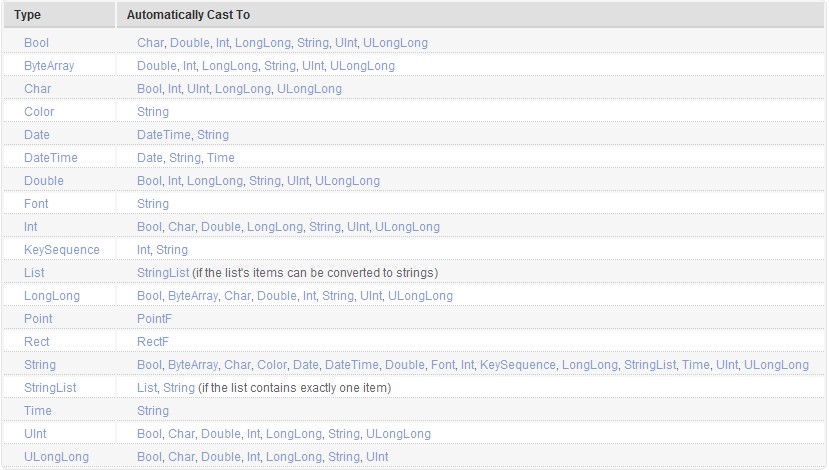QVariant相当于一个包含大多数Qt数据类型的联合体(源码解读)
Posted 朝闻道
tags:
篇首语:本文由小常识网(cha138.com)小编为大家整理,主要介绍了QVariant相当于一个包含大多数Qt数据类型的联合体(源码解读)相关的知识,希望对你有一定的参考价值。
将数据存储为一个Private结构体类型的成员变量d:
<qvariant.cpp>
1 QVariant::QVariant(Type type)
2 { create(type, 0); }
1 void QVariant::create(int type, const void *copy)
2 {
3 d.type = type;
4 handler->construct(&d, copy);
5 }
static void construct(QVariant::Private *x, const void *copy)
{
x->is_shared = false;
switch (x->type) {
case QVariant::String:
v_construct<QString>(x, copy);
break;
......
default:
void *ptr = QMetaType::construct(x->type, copy);
if (!ptr) {
x->type = QVariant::Invalid;
} else {
x->is_shared = true;
x->data.shared = new QVariant::PrivateShared(ptr);
}
break;
}
x->is_null = !copy;
}
1 QVariant::QVariant(int val)
2 { d.is_null = false; d.type = Int; d.data.i = val; }
<qvariant.h>
class Q_CORE_EXPORT QVariant
{
......
struct Private
{
inline Private(): type(Invalid), is_shared(false), is_null(true) { data.ptr = 0; }
inline Private(const Private &other)
: data(other.data), type(other.type),
is_shared(other.is_shared), is_null(other.is_null)
{}
union Data
{
char c;
int i;
uint u;
bool b;
double d;
float f;
qreal real;
qlonglong ll;
qulonglong ull;
QObject *o;
void *ptr;
PrivateShared *shared;
} data;
uint type : 30;
uint is_shared : 1;
uint is_null : 1;
};
......
Private d;
......
}
QVariant支持的数据类型:
1 enum Type {
2 Invalid = 0,
3
4 Bool = 1,
5 Int = 2,
6 UInt = 3,
7 LongLong = 4,
8 ULongLong = 5,
9 Double = 6,
10 Char = 7,
11 Map = 8,
12 List = 9,
13 String = 10,
14 StringList = 11,
15 ByteArray = 12,
16 BitArray = 13,
17 Date = 14,
18 Time = 15,
19 DateTime = 16,
20 Url = 17,
21 Locale = 18,
22 Rect = 19,
23 RectF = 20,
24 Size = 21,
25 SizeF = 22,
26 Line = 23,
27 LineF = 24,
28 Point = 25,
29 PointF = 26,
30 RegExp = 27,
31 Hash = 28,
32 EasingCurve = 29,
33 LastCoreType = EasingCurve,
34
35 // value 62 is internally reserved
36 #ifdef QT3_SUPPORT
37 ColorGroup = 63,
38 #endif
39 Font = 64,
40 Pixmap = 65,
41 Brush = 66,
42 Color = 67,
43 Palette = 68,
44 Icon = 69,
45 Image = 70,
46 Polygon = 71,
47 Region = 72,
48 Bitmap = 73,
49 Cursor = 74,
50 SizePolicy = 75,
51 KeySequence = 76,
52 Pen = 77,
53 TextLength = 78,
54 TextFormat = 79,
55 Matrix = 80,
56 Transform = 81,
57 Matrix4x4 = 82,
58 Vector2D = 83,
59 Vector3D = 84,
60 Vector4D = 85,
61 Quaternion = 86,
62 LastGuiType = Quaternion,
63
64 UserType = 127,
65 #ifdef QT3_SUPPORT
66 IconSet = Icon,
67 CString = ByteArray,
68 PointArray = Polygon,
69 #endif
70 LastType = 0xffffffff // need this so that gcc >= 3.4 allocates 32 bits for Type
71 };
数据类型转换:
以下数据类型可以自动转换

可通过成员函数bool QVariant::canConvert ( Type t ) const确定是否可执行指定数据类型的转换
自定义QVariant可存储的数据类型:
class Q_CORE_EXPORT QVariant
{
......
template<typename T>
bool canConvert() const
{ return canConvert(Type(qMetaTypeId<T>())); }
......
}
1 static inline QVariant fromValue(const T &value)
2 { return qVariantFromValue(value); }
template <typename T>
inline QVariant qVariantFromValue(const T &t)
{
return QVariant(qMetaTypeId<T>(reinterpret_cast<T *>(0)), &t, QTypeInfo<T>::isPointer);
}
从类的声明中可以看出,要成为QVariant可存储的数据类型,必须将该自定义数据类型通过宏Q_DECLARE_METATYPE (Type)注册到MetaType系统中
<qmetatype.h>
1 #define Q_DECLARE_METATYPE(TYPE) \\
2 QT_BEGIN_NAMESPACE \\
3 template <> \\
4 struct QMetaTypeId< TYPE > \\
5 { \\
6 enum { Defined = 1 }; \\
7 static int qt_metatype_id() \\
8 { \\
9 static QBasicAtomicInt metatype_id = Q_BASIC_ATOMIC_INITIALIZER(0); \\
10 if (!metatype_id) \\
11 metatype_id = qRegisterMetaType< TYPE >(#TYPE, \\
12 reinterpret_cast< TYPE *>(quintptr(-1))); \\
13 return metatype_id; \\
14 } \\
15 }; \\
16 QT_END_NAMESPACE
示例:
namespace MyNamespace
{
struct MyStruct
{
int i;
...
};
}
Q_DECLARE_METATYPE(MyNamespace::MyStruct)
1 MyStruct s;
2 QVariant var;
3 var.setValue(s);
4
5 ......
6
7 QVariant var2 = QVariant::fromValue(s);
8 if (var2.canConvert<MyStruct>())
9 {
10 MyStruct s2 = var2.value<MyStruct>();
11 }
http://www.cnblogs.com/paullam/p/3706371.html
以上是关于QVariant相当于一个包含大多数Qt数据类型的联合体(源码解读)的主要内容,如果未能解决你的问题,请参考以下文章
